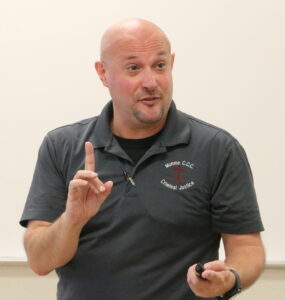The purpose of law enforcement is to “minimize conflict, keep the peace and follow the law.”
This was the theme of assistant criminal justice professor Dan Wood’s presentation about the role of police during civil unrest March 15.

His message connected the events of One Book, One Community’s annual book, “The Women of the Copper Country,” to the neutral position police must hold during protests.
Wood said police legally could not interfere with the copper mine union strike detailed in the book about the Copper Country Strike of 1913 in Calumet, Michigan. He said the police cannot interfere with anyone’s First Amendment rights unless they are breaching the peace.
“What law enforcement is tasked with doing is keeping the peace,” Wood said. “Once a crime has been committed, that must be addressed.”
“The Women of the Copper Country” depicts the true events of copper miners’ labor struggles in Calumet, resulting in a union strike that lasted from July 1913 to April 1914.
Wood said when the Michigan National Guard was called on the miners’ demonstration, no breach of the peace was found, and they were left uninterrupted.
He said the miners’ strongest tool against the oppressive mining company were strikes, so the company paid “strike busters” to stop the demonstration and reduce financial losses.
Wood said the strike busters did not have laws stopping them from interfering, unlike the police or National Guard. He said the strike busters were the ones who instigated conflicts at the union protest.
“It was the thugs working for the company, not official law enforcement,” Wood said. “Law enforcement is there to keep the peace.”
Wood said problems often arise when conflicting groups meet, such as the conflict between the Calumet protesters and the strike busters. He said people like the strike busters would be loyal to whomever paid them.
“Yet it all comes down to loyalty,” Wood said. “Who’s paying your check, who signs the check, that’s who you abide by.”
Wood said laws cannot favor one group’s freedom of speech over the other. He said laws can only regulate the time, place and manner of speech.
Journalism professor Matthew Bird-Meyer asked about the Unite the Right rally in Charlottesville, Virginia. White nationalists and counter protesters clashed from Aug. 11 to 12, 2017, over the removal of a Confederate statue, where they led a torch march through the University of Virginia campus. At one point, a vehicle drove into a crowd killing one. Bird-Meyer asked if the white nationalists were protected in their speech.
“Protected speech, exactly,” Wood said.
MCCC President Kojo Quartey then asked if hate-mongering was legal.
“They have a right to speak how they will,” Wood said. “The constitution protects your speech, and we can only regulate time, place and manner. Hate-mongering is not a type of speech.”
Michele Toll, OBOC co-chair and MCCC assistant English professor, who attended the presentation through Zoom, drew parallels from the Calumet protests to current times.
“Law and justice are viewed very differently by the protestors and the mine owners in the book,” Toll said.
Toll compared the protesting miners to Black Lives Matter groups in the modern day.
By Zoom, William Parker, president of the local NAACP, asked if using tactical forces such as fire hoses and releasing dogs on people in the 1960s was legal.
Wood said the police were out enforcing the law by whatever means they thought were necessary.
“Fortunately, those laws were deemed unconstitutional,” he said. “The fact those laws were in existence is the unfortunate part.”
Wood said that in criminology, it is important to learn from history or else it will be repeated.
“History dictates criminology,” he said.
Former MCCC professor Bob Leski, who was sitting in the audience, said different perspectives should be added to history classes to give context into the way people lived.
“One of the things missing from world history class is the quality of life – if you have all the history, it should give you different perspective on how well off we have it, but you don’t have quality of life – you mainly have leaders, wars, and etc.,” Leski said.
Wood reiterated that police cannot interfere with any kind of speech.
Wood chose to talk about the possibility of conflict between police and the public.
“Can this happen today? I mean, this was an interesting breach of the peace,” Wood said, pointing to the screen behind him, showing a picture of people storming the Capitol on Jan. 6, 2021.

